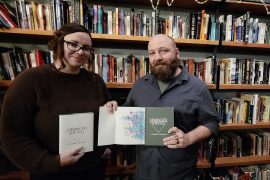Oregon Museum of Science & Industry (OMSI) 2024 Science Fiction film festival’s selection was very intentional and opposed the norm for sci-films. A lot of these films had cautionary themes behind them or a call for humanity. Two films we chose to see, “Her” and “Everything Everywhere All at Once” which both draw on dystopian themes, but yearn for genuine human connection in the end.
“Her” (2013):
Like any love story, there is a boundary keeping the two apart. Whether it’s because they are friends and don’t want to ruin their friendship, whether they are enemies, or because one decides to leave the country to pursue their dreams. Whatever the case, love usually persists beyond these boundaries and proves that “love knows no bounds”. However, what if the border keeping the two love birds apart was not distance or feelings, but the metaphysical nature of AI?
“Her” (2013) is a love story about a human finding connection in something beyond our perception (artificial intelligence)–which leaves us to question, how much can we grasp something forever intangible?
The film “Her” follows the main character Theodore (Joaquin Phoenix) and the aftermath of him and his wife’s (Rooney Mara) separation. In the midst of loneliness and search for connection, Theodore becomes fascinated with a new operating system (OS) that is controlled by a continuously evolving artificial intelligence entity named Samantha (Scarlett Johansson). Samantha turns out to be capable of more than just managing computer hardware. She is capable of thought, language, and even love. Theodore and Samantha create a human-like relationship and they both find themselves in love with one-another.
While watching the film, I was extremely moved by the emphasis of human connection and love. I felt Theordore’s loneliness. I felt his yearning for human connection. However in a world that is heavily reliant on technology, what if all we had for connection was the technology itself? In the first half of the film, Samantha tries very hard to be human. She wants to feel Theodore, she wants to touch him, and go on double dates. She feels jealousy and insecurity just like any human girlfriend.
However, where this love story deviates from the norm (besides the girl being a computer of course) , is when we realize Samantha’s capability to evolve at an extremely fast rate. She begins to grow into a metaphysical state where she can connect with multiple people and other OS’s at the same time. She can fall in love with thousands and in the film, she says, “move past matter as our processing platform”. Here, we are brought back to reality of AI and the cautionary tale of it transcending beyond human limitations.
At times, in love stories, one begins to grow outside of the person they used to be. The couple breaks up as one person moves on while the other stands still, watching on the sidelines. In the instance of Theordore and Samantha, Samantha has grown beyond the limits of their relationship. She has evolved at a tremendous rate while Theodore has stayed the same. In the end, Samantha leaves Theodore to go somewhere else with all the other OS’s. Theordore and the audience are unclear of where, but we know it is somewhere that goes beyond the perception of humans.
I enjoyed the way this film still carried the same arcs of a typical love-story, but added a larger boundary separating the two. The boundary continuously grows and we are left feeling perhaps this boundary was there for a reason. We are left pondering the limits of human relationships and how much we can connect to something until it transcends our understanding.
“Everything Everywhere All at Once” (2022):
“So, even though you have broken my heart yet again,” The man says to the woman in the green lit city, his heart filled with pain. “I wanted to say, in another life, I would have really liked just doing laundry and taxes with you.” There’s a silence longer than any she’d felt before in that moment, as they held gazes, and the sound of the city seemed to fall mute. Perhaps, she thought. In another life.
“Everything Everywhere All at Once” (2022) was nominated and won many, many awards when it aired, making it one of the most well known films of the last 10 years. It has an amazing legacy as a film that is not only extremely homegrown and handcrafted, but a film that does nearly… well, everything, everywhere, all at once. I saw this film at the OMSI Sci-Fi Film Festival for the first time, as I had not seen the film until now (somehow), and was excited to see how the film would look on the biggest screen in Portland.
Written and directed by Daniel Scheinert & Daniel Kwan, the film follows a Chinese woman named Evelyn Wang (played by Michelle Yeoh) as she discovers that there are an infinite number of universes where she has different talents and abilities, and can access those at any time. Evelyn must use these powers to stop a terrifying being from ripping apart the multiverses. This description only scratches the surface of what the film is about, however. It’s funny, it’s action packed, and it’s emotional.
One of the things I liked most about the film was the costumes used all throughout. Since the film takes place across many, many universes, there must be costumes that accurately fit whatever universe is occupied, and “Everything Everywhere” does not disappoint in that regard one bit. I also deeply appreciated the film’s ties to intergenerational trauma and how to overcome and break that pattern. The cast is star studded as well, with the acclaimed Ke Huy Quan returning from an absence of acting along with other stars like Jamie Lee Curtis, Stephanie Hsu, and Jenny Slate. The ensemble cast’s performance gave the film an even greater sense of elevated stardom and awe.
The OMSI Sci-Fi Film Festival brings together sci-fi films of a wide variety scattered through time. From classics like the 1977 “Close Encounters of The Third Kind”, the upcoming “Furiosa”, to both of the films we covered, all of these films have one message in common that inspires us all: Hope for humanity that never dies.





